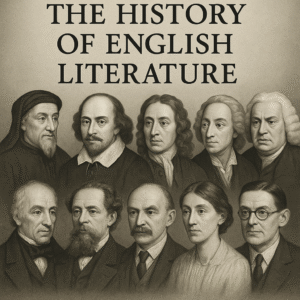Introduction to Aldhelm as a Writer Aldhelm as a Writer occupies a central place in Anglo-Saxon literary history. Consequently, his works bridge Latin scholarship and vernacular culture effectively. Moreover, his writings demonstrate deep understanding of Christian doctrine. Furthermore, Aldhelm shows Read More …
Category: The History of English Literature

The History of English Literature offers a rich exploration of the development of literary works from the earliest Anglo-Saxon texts to contemporary masterpieces. This category provides in-depth articles, study guides, quizzes, and timelines covering key literary periods such as the Old English era, Middle English literature, the Renaissance, Neoclassical Age, Romantic Movement, Victorian literature, and Modernist innovations. Whether you are a student, researcher, or literature enthusiast, you’ll find detailed analyses of major writers like Geoffrey Chaucer, William Shakespeare, John Milton, Jane Austen, Charles Dickens, and T.S. Eliot. Discover how historical events, cultural movements, and philosophical ideas shaped the evolution of English literature over the centuries. Enhance your understanding of literary techniques, themes, and genres as you navigate through the fascinating journey of English literary history. This resource is ideal for exam preparation, academic research, and anyone passionate about the legacy of English literary traditions.
King Alfred the Great: The Founder of English Prose
I: The Crisis and The Royal Mission 1. The Collapse of Learning in 9th Century England The relentless Viking raids caused not just conquest and material devastation everywhere. Crucially, they destroyed monasteries, vital centers of all intellectual activity. Consequently, literacy Read More …
Bede as a Writer of the Anglo-Saxon Period
Introduction Bede stands as a key Anglo-Saxon figure. He earned the title “Venerable Bede.” His voluminous writings fully illuminate the entire period. He clearly showed the religious and political landscape of his age. His comprehensive output defines early English history. Read More …
Cynewulf as a Writer-Anglo-Saxon Period
Cynewulf as a Writer: Introduction Cynewulf as a Writer is significant. He is an identifiable Anglo-Saxon poet. His surviving works offer a glimpse. They show the religious landscape. They show the early medieval poetic landscape. His output helps us understand Read More …
Caedmon as First English Poet-Anglo-Saxon Period
Introduction Caedmon as First English Poet emerges as the earliest known figure in English poetry. Furthermore, his work embodies religious devotion, moral reflection, and cultural transition. He lived during the Anglo-Saxon period, a time of oral tradition and emerging literacy. Read More …
William Faulkner as Modernist Writer: Themes & Innovations
1. Early Life and Family Influences William Faulkner as Modernist Writer was shaped profoundly by his southern upbringing and family heritage. Furthermore, he absorbed local stories, traditions, and dialects that would later influence his narrative style. His family’s history provided Read More …
Aldous Huxley as Writer: Visionary Themes and Literary Impact
Introduction to Aldous HuxleyAldous Huxley as Writer stands among the most influential literary figures of the twentieth century. He consistently explores human nature, society, and spiritual awareness with clarity and imagination. Furthermore, he blends philosophical inquiry with fictional storytelling to Read More …
E.M.Forster as Modernist Writer
IntroductionE.M.Forster as Modernist Writer transforms fiction through consciousness, morality, and perception continuously. Moreover, his novels unite social realism and psychological depth elegantly. Forster explores interior awareness, ethical growth, and spiritual longing intensely. Consequently, his fiction bridges nineteenth-century tradition and modern Read More …
D.H.Lawrence as Modernist Writer
Introduction D.H.Lawrence as Modernist Writer transforms literature profoundly. Moreover, he integrates consciousness, emotion, and ethical reflection naturally. His novels, essays, and poems explore human desire, identity, and social tension elegantly. Consequently, readers experience psychological realism, symbolic meaning, and narrative experimentation Read More …
Virginia Woolf as Modernist Writer
IntroductionVirginia Woolf as Modernist Writer transforms literature profoundly. Moreover, she explores consciousness, interiority, and time naturally. Narrative experiments with stream of consciousness, free indirect style, and psychological depth elegantly. Consequently, her works illuminate character, perception, and social context permanently. Transition Read More …
